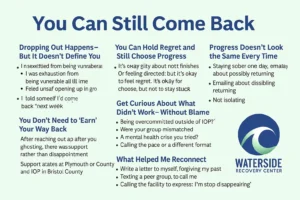I thought I’d ruined everything.
When I stopped showing up to IOP, I didn’t plan it. There wasn’t one dramatic event—just a few missed groups, then a growing sense of dread about going back. Every day that passed made it harder. Shame crept in. I started telling myself I’d failed. That I wasn’t “serious enough” or “ready” for recovery. That maybe I didn’t deserve the help.
If you’re in that place—or somewhere near it—I want you to know this: you’re not the only one. And you’re not stuck.
Leaving treatment doesn’t mean you can’t come back. It doesn’t mean you weren’t trying. And it absolutely does not mean you failed.
This blog is for anyone who dropped out of IOP– including our Intensive Outpatient Program in Plymouth— and feels stuck in shame, afraid to reach out, or unsure how to take the next step. I’ve been there. Let me walk with you for a bit.
Dropping Out Happens—But It Doesn’t Define You
Let’s start here: dropping out of treatment is more common than you think.
It doesn’t mean you didn’t care. It doesn’t mean you were lying when you said you wanted help. It usually just means something got too hard—internally, externally, or both.
Here’s what made me step away:
- I was exhausted from being vulnerable all the time.
- I had days when I didn’t feel safe opening up in group.
- I got triggered and didn’t know how to talk about it.
- I told myself I’d come back “next week.” That week never came.
It’s not about excuses. It’s about understanding. When you know why you paused, you can move forward with more clarity and compassion—not just punishment and pressure.
You Don’t Need to “Earn” Your Way Back
This was a hard one for me to believe.
After I ghosted, I assumed I’d have to apologize. Prove I was serious. Make a big declaration that this time I was really ready.
I didn’t.
When I finally reached out, I was bracing for disappointment. But what I got was a calm voice that said, “Hey. We’re glad you called. How can we support you?”
That moment changed everything. It reminded me that the door wasn’t closed. It was still open—and had been the whole time.
At Waterside Recovery, that open-door spirit is real. Whether you’re in Bristol County or looking for IOP in Plymouth County, they’ll meet you where you are—not where you think you should be.
You Can Hold Regret and Still Choose Progress
You might feel guilty. I did too.
Maybe you left after a tough week, or right before a breakthrough. Maybe someone in group reached out and you didn’t answer. Maybe you’re embarrassed.
That’s all part of being human.
It’s okay to feel regret. But it’s not a reason to stay stuck. You can carry that feeling without letting it block your path forward.
Here’s what helped me shift:
“I don’t have to erase the past. I just don’t have to relive it every time I think about recovery.”

Get Curious About What Didn’t Work—Without Blame
This part is important.
If you’re considering returning—or even just exploring options—it helps to look at what made staying hard last time.
Ask yourself:
- Were you overcommitted outside of IOP?
- Did your group feel mismatched?
- Were you struggling with a mental health crisis you didn’t talk about?
- Did you need a slower pace or a different format?
This isn’t about figuring everything out. It’s about helping your future support team know what might need to change. When I came back, I shifted to afternoon IOP because mornings just weren’t working. That one change helped me stay.
Progress Doesn’t Look the Same Every Time
I used to think progress meant attending every session, completing every assignment, and hitting every goal.
Now I know better.
Progress can mean showing up after three missed groups. Progress can mean emailing the program director just to say, “I’m thinking about coming back.” Progress can mean staying sober one more day—or just not isolating.
You don’t need to impress anyone to be worth helping. You just need to start where you are.
What Helped Me Reconnect
Here’s what actually made a difference when I was ready to move forward:
- I wrote a letter to myself, forgiving the version of me who left.
- I texted a peer from group, just to say hi and see how they were doing.
- I called the facility and said the truth: “I don’t know what I need, but I want to stop disappearing.”
There’s no perfect way back. There’s just the next step.
FAQ: Dropping Out of IOP and Returning Later
Is it normal to leave treatment and want to come back later?
Yes. Many people step away from IOP and return weeks, months, or even years later. You’re not the only one.
Do I have to start over from the beginning?
Not necessarily. Some clients pick up where they left off. Others request a fresh start. Waterside Recovery will tailor your re-entry based on your needs.
Will the staff be upset with me?
No. Waterside’s team understands that treatment isn’t linear. You’ll be met with compassion and support—not judgment.
What if I don’t feel ready yet?
You don’t need to feel “ready.” You just need to be open to the possibility of support. Readiness often grows once you re-engage.
Can I come back even if I’ve relapsed?
Yes. Relapse is common. It doesn’t erase your progress, and it doesn’t disqualify you. We’ll help you stabilize and figure out your next best step.
Is it okay to return part-time or ask for a slower start?
Absolutely. Whether it’s fewer groups or a different schedule, the team will help build something that works for where you are right now.
Your Spot Isn’t Gone. You’re Just On Pause.
Think of your recovery like a trail. You might step off for a while. Rest. Get lost. Sit down and cry. But the trail doesn’t disappear. It’s still there. And the moment you decide to walk again, you’re back on it.
You don’t have to race. You don’t have to know the whole route. You just have to take one step.
Call (866) 671-8620 to learn more about our IOP services in Plymouth County, MA.
You haven’t failed. You’re not behind. You’re just still on your way.


